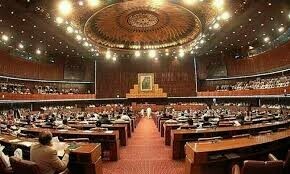HANOI, Nov 17: US President George W. Bush urged full implementation of UN sanctions against North Korea on Friday as he arrived at a Pacific Rim summit dominated by the drive to get the communist nation to abandon its nuclear programme.
Bush, who on Friday became only the second US president to visit Vietnam since the US war here, and other leaders at the Asia-Pacific Economic Cooperation forum embarked on a campaign to forge a united front in disarmament talks with North Korea.
''We have a chance to solve this issue peacefully and diplomatically,'' Bush said, referring to upcoming six-nation negotiations with the North. ''It's important for the world to see that the Security Council resolutions which were passed are implemented.''
The leaders were to hold a barrage of bilateral meetings on Saturday on the sidelines of the larger summit, many of them focused on security concerns in the region and beyond, such as North Korea, terrorism, the war in Iraq and Iran's nuclear development.
In the run-up to the weekend summit, Apec economic and foreign ministers have issued calls to restart stalled world trade talks, discussed a US-backed proposal to establish a region-wide free-trade zone, and debated other issues such as energy security and climate change.
On Friday, business leaders praised communist Vietnam for its stunning progress in reforming its economy and joining the world trading system, as Hanoi showcased its transformation from a war-ravaged backwater to a fast-growing exporter.
The praise has translated into opportunities for Vietnam, which this week signed at least three deals with US companies worth $1.64 billion.
Apec, which includes some of the world's fastest growing economies and accounts for more than half the globe's economic production, has generated almost a giddy, bazaar-type atmosphere as members gather to capitalize on their new wealth.
Russia, as the only European member, is eager to seek out new export customers and peddle its vast reserves of oil and gas in an increasingly energy-hungry region. Russian President Vladimir Putin planned to field a formidable team of Russian executives when he arrives on Saturday.
''In Apec we are looking for new markets to sell our products,'' said Vladimir Frolov, a senior official with Russia's Economic Development and Trade Ministry. Asia is also seen as key for galvanizing economic growth in Russia's far-flung regions, which lag the breakneck expansion seen closer to Europe.
Still, much of the high-profile action on the sidelines of the conference focused on security, especially North Korea.
In meetings this week, the US, Japan and South Korea have been trying to coordinate strategy ahead of next month's expected resumption of six-party talks on North Korea's nuclear programme. The North announced it would end a boycott of the talks after its Oct 9 nuclear test.
A large share of the attention was on the implementation of UN Security Council sanctions imposed on North Korea. Some doubts have arisen over how ardently South Korea, which has followed a policy of engagement with the North, and China, the North's top ally, would enforce the punishments.
A Japanese government official said on Friday that Japanese Prime Minister Shinzo Abe would encourage South Korean President Roh Moo-hyun to follow the sanctions in a meeting on Saturday. ''It is our intention to keep urging South Korea on this point in the summit,'' the official said in a briefing ahead of the meeting conducted on condition of anonymity.
Abe also was to hold separate meetings with Bush, Chinese President Hu Jintao, and Putin. It is Abe's first meeting with Bush since the Japanese prime minister took office in September. ''The Japan-US alliance is the foundation of Japan's security and diplomacy,'' Abe said before boarding a government plane in Tokyo. ''I plan to start by building trust with President Bush.''
Apec, formed in 1989 as an economic forum, has rapidly expanded its agenda in recent years to cover political, security and even environmental and health issues. Its members account for 45 per cent of the world's trade and 41 per cent of its population.
BUSH: Vietnam shows there is no “instant success” in fight for freedom
US President George W. Bush, on his first visit to a country where America lost a two-decade-long fight against communism, said on Friday the Vietnam War's lesson for today's confounding Iraq conflict is that freedom takes time to trump hatred.
Embracing a former enemy that remains communist but is allowing capitalism to surge, Bush opened a four-day stay here that was fuelling an already raging debate over his war policy. Democrats who won control of Congress say last week's elections validate their call for US troops to start coming home soon, while Bush argues-- as he did again Friday-- for patience with a mission he says can't be ended until Iraq can remain stable on its own.
A baby boomer who came of age during the turbulent Vietnam era and spent the war stateside as a member of the Texas Air National Guard, the president called himself amazed by the sights of the onetime war capital. He pronounced it hopeful that the United States and Vietnam have reconciled differences after a war that ended 31 years ago when the Washington-backed regime in Saigon fell.
''My first reaction is history has a long march to it, and societies change and relationships can constantly be altered to the good,'' Bush said after speeding past signs of both poverty and the commerce produced by Asia's fastest-growing economy.
The president said there was much to be learned from the divisive Vietnam War as his administration contemplates new strategies for the increasingly difficult war in Iraq. But his critics see parallels with Vietnam, a determined insurgency and a death toll that has drained public support, that spell danger for dragging out US involvement in Iraq.—AP













































Dear visitor, the comments section is undergoing an overhaul and will return soon.